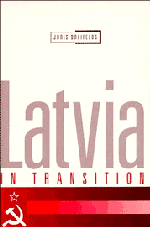Book contents
- Frontmatter
- Contents
- List of table
- Acknowledgments
- Introduction
- 1 Historical residues and impact on present-day politics
- 2 The Latvian national rebirth
- 3 Regaining independence – establishing democracy
- 4 Economics and reform
- 5 Demography, language and ethnic relations
- Conclusion
- Notes
- Select bibliography
- Index
Conclusion
Published online by Cambridge University Press: 01 June 2011
- Frontmatter
- Contents
- List of table
- Acknowledgments
- Introduction
- 1 Historical residues and impact on present-day politics
- 2 The Latvian national rebirth
- 3 Regaining independence – establishing democracy
- 4 Economics and reform
- 5 Demography, language and ethnic relations
- Conclusion
- Notes
- Select bibliography
- Index
Summary
Latvia and the other post-Soviet republics have been able to break the ties of empire and are independent state actors recognized as sovereign bodies by most countries of the world. However, independence, no matter how important, is still only one dimension of the new reality demanding readjustments by post-Soviet societies. All of these newly independent republics face enormous problems of stabilization and reform. Many are involved in armed conflicts and disputes over state boundaries and political leadership. There are conflicts over state languages and the political and economic rights of different ethnic and religious groups. Most of these states have only begun to come to terms with their own true history, their relative backwardness and the bankruptcy of their former guiding ideology. All these areas have the potential for creating significant changes in attitudes, loyalties and strategies of future development.
No two republics of the former Soviet Union are alike. They each carry different strengths and weaknesses; they inherited different historical, economic and demographic residues and hold their own views of an ideal future. Within this group of newly independent countries the Baltic republics appear to have taken the most rapid steps towards reform in areas that are considered important by Western countries as criteria of progress.
- Type
- Chapter
- Information
- Latvia in Transition , pp. 170 - 182Publisher: Cambridge University PressPrint publication year: 1996



